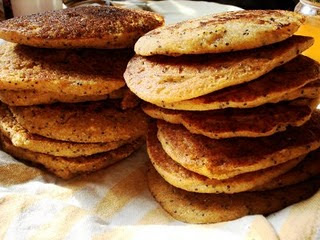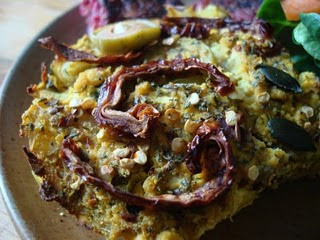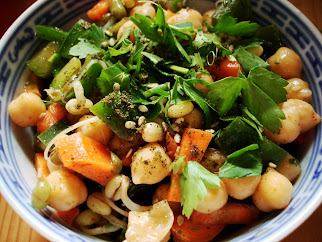Goodnight Gluten-Headache.
>> Monday, February 23
It happens to all of us every once and a while-no matter how diligent we are, a little gluten slips in when we least expect it. Maybe it was a new product you tried, and misread the ingredient label on; often it's a loving friend who just wants to offer something yummy and assures you falsely (albeit good-heartedly) that it's gluten-free. One thing's certain: you get a feeling of dread as soon as you realize what has happened.
This time, I was over at a friend's house for brunch. There was an akward moment of realization as I took my second bite of homemade fake meat ("Is it gluten-free?" "Yes, yes, just seeds and nuts and stuff, nothing with gluten...") and the cook listed off the ingredients excitedly:
"...sunflower seeds, and then a little old bread to hold it together-"
"Old BREAD?"
And a thundering silence. What's better is, the "gluten-free cake" of that evening was also laced with wheat flour, and the next day, I felt significantly bogged down with a load of unwanted feelings.
What are your symptoms like? Mine begin with a flushed, hot feeling, bloating, abdominal pain, and some other lovely unmentionables, and end with 1-2 days of headache, fatigue, intense sugar-cravings, and an upset stomach. It's not a process I enjoy and it's one I work really hard to avoid. Duh. Pain just isn't fun. But if I know it's coming, I better be willing to do something more than wait in terror, or I'll be adding placebo to reality and just compounding the damage. Positive thinking makes a difference. That's something I really believe. And no matter how tempting it is to curl up in self-pity, call in sick, and resent all gluten-eaters, I gotta realize it hurts no one but myself.
So, I'm trying to balance the damage by treating myself ridiculously well. First things first: Celiacs who eat gluten damage their intestines. That just sucks. The pain I feel in my abdomen is indigestion and the destruction of a few little villi, the fingers that absorb nutrients as food passes through. That means it's harder for me to get nutrients, and as many of you have probably experienced, iron-deficiency is a leading side-effect of celiac's disease. Women especially, beware, it is just not funny to get anemic. So, munch on lightly steamed dark greens (unless you have good fresh spinach available. Then you should eat it raw) with lots of lemon juice. The vitamin C will make the iron more accessible, and it just tastes great. Other great snacks are soaked pumpkin seeds, or rice cakes and molasses.
Second, because my body cannot digest gluten, it treats it as a toxin. Our bodies are intelligent vessels, and when they sense something bad coming in, they work double-time to get it out. That means taking energy from other functions and using them for back-up on the clean-up crew. The reason I feel so sluggish and crappy is that it's busy fighting gluten and doesn't have time to keep everything else going full-speed. Our instinct when faced with fatigue is often to eat more. Food=energy, right? What this actually does is route your body's attention away from the problem of eradicating toxins to the task of digesting new food. Of course, it's going to have a hard time doing that with a load of glutinous gunk blocking the way, and you are, in fact, just stressing out an already stressed system. So, stop trying to battle the fact that you feel a little crummy and just remember that there is a very specific reason for it, and your body is obviously doing it's job or you wouldn't feel anything.
To avoid putting extra burdens on your digestive system, the best thing you can do is eat very small portions of very soothing, nutritious food. Soup, beans, brown rice and veggies, and nothing heavily spiced, salted, or sugared. If you're going to eat onions or other intense foods, cook them well, because extra gases will only be uncomfortable. And try to eat things high in fiber, to help evacuate your digestive tract. Even if it feels like adding more to the mess in your intestine is going to somehow balance out the bad, more food is not the answer. Be patient, drink lots of water, and everything will sort itself out.
Third, enzymes could help a lot depending on the type of intolerance you have. If you don't have one already, consider getting a good degestive enzyme to keep around, if only for the days post-gluten when you really need something to calm your intestine. More information on enzymes and gluten-intolerance is available here.
Well, speaking of sluggish, I'm ready for bed, and I'm hoping tomorrow things will be coming back to normal. I'm devising some fiber- and iron-rich savory granola for tomorrow to help get back all the things I'm lacking right now, and if it's edible I'll post the recipe! Above all, just keep smiling. Skip the panic and go straight to nurture next time your friend's mom tells you proudly about the gluten-free meal she just served with only "a little flour" in it! Goodnight gluten-headache, and don't bother waking me up when you leave tomorrow...







0 comments:
Post a Comment